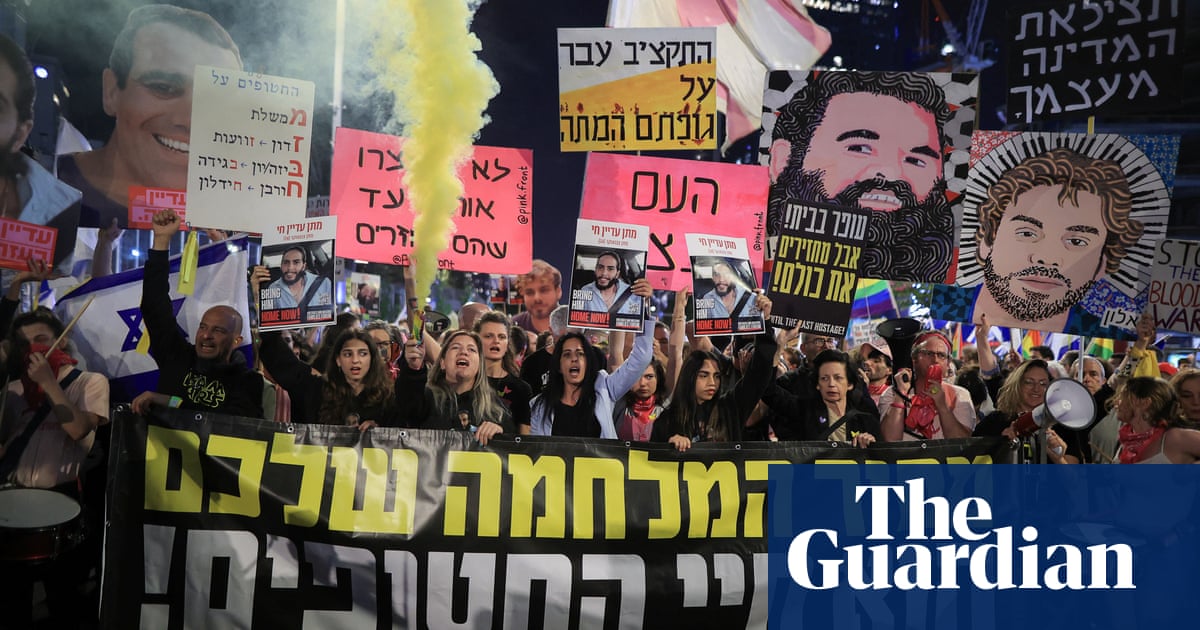Israel to begin negotiations on second phase of Gaza ceasefire deal – foreign minister
During his press briefing earlier today, Israeli foreign minister Gideon Saar said Israel will begin negotiations on the second phase of the Gaza ceasefire deal this week.
“We had yesterday night a security cabinet meeting. We decided to open negotiations on the second phase. It will happen this week,” Saar said of the talks, which were originally supposed to start on 3 February.
Negotiations on a second phase of the agreement, which mediators had hoped would agree the release of the remaining hostages as well as the full withdrawal of Israeli troops from Gaza, were supposed to be already underway in Doha, but Qatar has said the talks have not officially started yet.
Saar also said that Israel demanded the “complete demilitarisation of Gaza”, and would “not accept the continued presence of Hamas or any other terrorist groups” in the Palestinian territory.
Key events
Benjamin Netanyahu is making “tremendous efforts” to release six living hostages and the bodies of four others this week, an Israeli official source told AFP. The news agency also reports that mediators were working hard to ensure “the bodies of several Israeli prisoners (be delivered) before Friday” and to increase the number of living hostages to be released on Saturday.
Israeli officials have said they believe eight of the 33 people to be returned in the ceasefire’s first phase are dead. Hamas is gradually releasing the 33 hostages in exchange for nearly 2,000 Palestinians detained in Israeli jails. Under the agreement, Israeli forces have pulled back from most parts of Gaza and allowed an increase in humanitarian aid.
Israel is preparing to receive six hostages on Saturday, in addition to a number of captives’ bodies to be delivered from Gaza on Thursday, according to reports.
The truce agreement appeared in danger of collapse earlier this month after Hamas announced there would be an indefinite delay to the release of (some of the) hostages owing to Israel’s violations of the deal.
The Palestinian militant group accused Israel of delaying the return of Palestinians to northern Gaza, blocking the arrival of aid and attacking civilians. Soon after, US President Donald Trump suggested that Israel should demand that the remaining hostages be freed by midday on Saturday 15 February or “all hell is going to break out”.
The immediate crisis appeared to recede with Hamas subsequently confirming the three Israelis hostages would be freed, although a great deal of uncertainty remains over the longer-term prospects of the ceasefire agreement.
Here is more of Gideon Saar’s comments about Israel planning to open negotiations on the second phase of the three-stage Gaza ceasefire agreement that came into effect on January 19 2025 (we are still in the first phase).
“Until this Saturday, there was a threat by Hamas to break the agreement,” he told journalists in the briefing.
“They regretted, eventually. But now, yesterday night, in the security cabinet meeting we decided to open negotiations on the second phase. It will happen this week.”
When asked what will happen when phase one ends at the beginning of March, if there is no decision on what happens in phase 2, he said there are “three options”. The first is an agreement on phase 2, the second is that negotiations won’t lead anywhere and they will take military options. The third is to see a “constructive dialogue of getting to an agreement” and potentially making the “timeframe [go] longer.”
He also said a “deradicalisation” process would be needed to take negotiations further. Saar said:
The problem is that what is needed is a deradicalisation process and a deep one. According with our experience with the Palestinian authorities for 30 years, they… were poisoning the minds of the next generation. They were just as bad as Hamas. The issue is the policies, with whom you can promote a strategy of deradicalisation.
Israel to begin negotiations on second phase of Gaza ceasefire deal – foreign minister
During his press briefing earlier today, Israeli foreign minister Gideon Saar said Israel will begin negotiations on the second phase of the Gaza ceasefire deal this week.
“We had yesterday night a security cabinet meeting. We decided to open negotiations on the second phase. It will happen this week,” Saar said of the talks, which were originally supposed to start on 3 February.
Negotiations on a second phase of the agreement, which mediators had hoped would agree the release of the remaining hostages as well as the full withdrawal of Israeli troops from Gaza, were supposed to be already underway in Doha, but Qatar has said the talks have not officially started yet.
Saar also said that Israel demanded the “complete demilitarisation of Gaza”, and would “not accept the continued presence of Hamas or any other terrorist groups” in the Palestinian territory.
Campaigners urge F-35 fighter jet producing nations to stop supplying Israel

Geneva Abdul
Geneva Abdul is a reporter for the Guardian
More than 200 organisations worldwide have called on nations involved in producing F-35 fighter jets to “immediately halt all arms transfers to Israel” amid fears they have failed to prevent the planes from being used to violate international law.
The letter, signed by 232 civil society organisations, was sent on Monday to government ministers in Australia, Canada, Denmark, Italy, the Netherlands, Norway, the US and the UK as the war in Gaza reached 500 days.
The sponsors hail from the jet-building nations as well as Belgium, Jordan, Lebanon, Switzerland, Ireland, India and elsewhere. High-profile charities and NGOs, such as Human Rights Watch, Amnesty International and Oxfam, are among the sponsors.
The letter, coordinated by the Campaign Against Arms Trade (CAAT), reads: “The past 15 months have illustrated with devastating clarity that Israel is not committed to complying with international law.
“Partners to the F-35 programme have individually and collectively failed to prevent these jets from being used to commit serious violations of international law by Israel.”
It adds: “States have either been unwilling to observe their international legal obligations and/or claimed that the structure of the F-35 programme means that it is not possible to apply arms controls to any end-user, making the entire programme incompatible with international law.”
You can read the full story here:
Back to news coming out of Lebanon. The country’s new government will negotiate with the International Monetary Fund for a new programme and will work to deal with the country’s financial default and public debt, according a policy statement – seen by Reuters – that has been approved by the cabinet. It also said the government would work towards an economic recovery achieved primarily through the reform of the banking sector.
Lebanon is still grappling with a crippling economic crisis, now in its sixth year, which destroyed its state electricity sector and left many in poverty unable to access their savings. The local currency lost much of its value and commercial banks severely restricted foreign currency withdrawals.
Israel’s foreign minister, Gideon Saar, is giving a media briefing as Israeli troops remain in Lebanon beyond the agreed withdrawal date. You can watch the stream in the video at the top of this blog. We will give you any key lines that come out of the conference.
Lebanon will consider any remaining Israeli presence on its lands an occupation – presidency
As we mentioned in a previous post, Israeli forces have withdrawn from border villages in southern Lebanon but have remained in five points inside the country for what the IDF describes as security purposes.
Israeli defense minister Israel Katz said the Israeli army “will stay in a buffer zone in Lebanon in five control posts” to guard against any ceasefire violations by Hezbollah. He also said the army had erected new posts on the Israeli side of the border and sent reinforcements there.
In response, a spokesperson for the Lebanese presidency has just said Lebanon will consider any remaining Israeli presence on its lands an occupation and has the right to use all means to ensure a full Israeli withdrawal, as stipulated in the truce deal.
Hezbollah secretary general Naim Qassem said over the weekend that any Israeli military presence on Lebanese soil after 18 February would be considered an occupying force. “Everyone knows how an occupation is dealt with,” he said.
International aid agencies have repeatedly accused Israel of blocking or delaying distribution of vital food, medicine and fuel over the course of its war on Gaza.
As part of the ceasefire deal, aid to the territory should increase to 600 trucks a day, above the 500 minimum that aid agencies say is needed to contain Gaza’s devastating humanitarian crisis.
Oxfam’s initial assessment of the damage to infrastructure after the ceasefire came into effect in late January found:
-
More than 80% of water and sanitation infrastructure across the Gaza Strip has been partially or entirely destroyed by Israeli attacks, including all six major wastewater treatment plants.
-
85% of the sewage pumping stations (73 out of 84) and networks have been destroyed. Some have been repaired but urgently require fuel to operate.
-
85% of small desalination plants (85 out of 103) have been partially damaged or completely destroyed.
-
67% of the 368 municipal wells have been destroyed. Most of the private small wells cannot function due to lack of fuel or generators.
Destruction of water and sanitation networks caused ‘catastrophic health conditions’ in Gaza, Oxfam warns
Oxfam has warned that not enough aid is coming into Gaza, especially in the northern part of the territory and the southern Rafah governate devastated by Israeli bombardments during the war.
The charity says the picture remains “extremely bleak and dangerously critical”, although it says the amount of water available to Palestinian people has increased since the truce between Israel and Hamas came into effect on 19 January.
This has been made possible partly due to fuel being allowed into the Strip to operate water and sanitation facilities.
Oxfam said 15 months of Israel’s war has destroyed 1,675 kilometres of water and sanitation networks.
In the North Gaza and Rafah governorates less than 7% of pre-conflict water levels is available to people, the charity said in a press release.
Just 5.7 litres per person per day is available, the equivalent of roughly one toilet flush.
Clémence Lagouardat, Oxfam’s humanitarian coordinator in Gaza, said:
Now that the bombs have stopped, we have only just begun to grasp the sheer scale of destruction to Gaza’s water and sanitation infrastructure. Most vital water and sanitation networks have been entirely lost or paralyzed, which is creating catastrophic hygiene and health conditions.
Our staff and partners have told how people are stopping them in the streets asking for water, and that parents are not drinking to save water for their children. It is heartbreaking to hear about children having to walk for miles for a single jerrycan of water.
Al Jazeera has a list of the five so-called “strategic locations” in southern Lebanon Israeli troops will stay in past the withdrawal deadline. The Israeli military has cast this as a “temporary” deployment at five hill tops that give “vantage points” on Israeli communities over the border. They are:
-
a hill near Labbouneh, across from the northern Israeli town of Shlomi
-
the Jabal Blat peak, across from the Israeli town of Zar’it
-
a hill across from the Israeli towns of Avivim and Malkia
-
a hill across from the Israeli town of Margaliot
-
a hill across from the Israeli town of Metula.
Israeli defence minister, Israel Katz, has said the IDF will “forcefully” enforce the ceasefire deal in Lebanon.
He was quoted as saying:
Starting today, the IDF will remain in a buffer zone in Lebanon in five strategic outposts and will continue to enforce forcefully and without compromise against any violation by Hezbollah.
Hezbollah must withdraw fully beyond the Litani River line and the Lebanese army must enforce and disarm it under the supervision of the mechanism established under the leadership of the US.
We are determined to provide full security to all northern communities.
Israeli troops remain in five locations in Lebanon after a deadline for their full withdrawal lapsed
Hello and welcome to the Guardian’s live coverage of developments in the Middle East.
Israel’s army has left southern Lebanese villages but remains in five positions, a Lebanese security source told Agence France-Presse (AFP), as a deadline for their withdrawal agreed to under a peace deal with Hezbollah expired.
“The Israeli army has withdrawn from all border villages except for five points, while the Lebanese army is gradually deploying due to the presence of explosives in some areas and damage to the roads,” the source told AFP.
Israeli troops pulled out from Yaroun, Maroun al-Ras, Blida, Meiss el-Jabal, Hula, Markaba, Odaisseh, Kfar Kila, and Wazzani, according to reporting from the Lebanese national news agency, which said Lebanese soldiers and UN Interim Force in Lebanon forces (Unifil) have been sent to the “liberated towns”.
The US/France brokered ceasefire deal, that came into effect on 27 November 2024, required Israeli soldiers to withdraw from southern Lebanon and for Hezbollah to move its fighters and heavy weaponry north of the Litani River, about 16 miles (25km) north of the frontier.
The original deadline was in late January but Israel and Lebanon agreed to extend it to 18 February. Both sides have exchanged accusations of violating the ceasefire agreement, which ended 14 months of fighting between Israel and Hezbollah.
“We will leave small amounts of troops deployed temporarily in five strategic points along the border in Lebanon so we can continue to defend our residents and to make sure there’s no immediate threat,” Lt. Col. Nadav Shoshani, a military spokesperson, told reporters yesterday afternoon.
About 60 people have reportedly been killed since the truce began, two dozen of them on 26 January as Lebanese residents tried to return to border towns on the initial withdrawal deadline.
In some other developments:
-
Itamar Ben-Gvir has suggested that the Egyptian government may have had a role to play in the Hamas-led attack on southern Israel on 7 October 2023, in which 1,200 people were killed and 251 taken hostage. “They [Egypt] have a role in what happened on October 7,” the former national security minister, who resigned from Benjamin Netanyahu’s cabinet in protest over the Gaza ceasefire deal, said in comments carried by Israeli state radio. “There was probably some partnership, or at the very least, a willful blindness.”
-
An alternative to Donald Trump’s proposal for the effective ethnic cleansing of Palestinians from Gaza is being prepared by Egypt, under which Hamas would be formally excluded from governance and control of the territory’s reconstruction. The process would be handed over on an interim basis to the control of a social or community support committee. No member of Hamas would sit on the committee (you can read more about the alternative plan here).
-
The World Bank will release an assessment of damages to infrastructure in Gaza in coming days. It is expected to provide a fuller overview of damage done to the territory by Israeli airstrikes after an interim report in April showed it suffered $18.5bn in damages to critical infrastructure in the first four months of the war.









